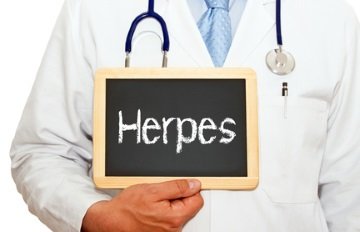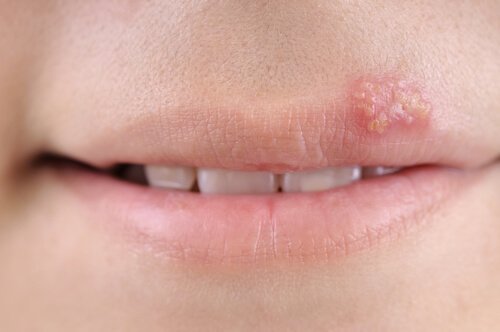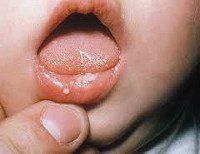Cold sores are a common infectious disease that does not stop at children. It is caused by the herpes simplex virus type 1, with which over 80% of children have already had contact by the end of the second year of life. The course of the disease is usually harmless, but can be dangerous for young infants.

In this article
In addition to type 1 of the herpes simplex virus, which causes the known cold sore, there is also a type 2, which is responsible for genital herpes. However, this second form is very rare in children. A newborn may be infected at birth by the sick mother. Be >
How your child can get infected
The fluid in the small vesicles, which are characteristic of cold sores, is particularly contagious. Mainly by smear infection, a sick person can pass the herpes virus on to other people. The pathogen is stable and survives, for example, on a drinking glass or on a bottle.

If you occasionally suffer from cold sores, please take special care during this time that your child does not drink from your glass. You can also infect your surroundings with kisses. It is important to know that most of the first illnesses are not dangerous and are without complaints. You may not even notice when your child is infected with the herpes virus for the first time.
symptoms
Even if the majority of initial infections are without symptoms, your child can be one of the few people who get sick. Typical complaints related to the herpes virus include:
- painful blisters and canker sores on the oral mucosa
- rarely vesicles in other parts of the body
- Purification of the vesicles by bacteria
- rotten bad breath
- high fever
- Swelling of the surrounding lymph nodes
Once the symptoms have subsided, the viruses hide in nerve cells in the area of the face. There they wait until the immune system has a weak moment and can no longer keep them at bay. Typical requirements are:
- fever
- physical or mental stress
- strong impact of UV radiation on the skin (sea, high mountains in the snow)
- extensive injuries
- drugs
- a changed hormonal situation, such as during pregnancy or at the time of the menstrual period
The symptom of a new outbreak of the HS virus is the typical rash with lip sores, which often begin with a tingling sensation and a slight swelling of the lip. Later, the vesicles burst painfully, crust over and heal without consequences after about a week.
Caution in children with eczema
If your child’s skin is already damaged by a chronic illness, such as neurodermatitis or psoriasis, the herpes can spread quickly to the damaged skin. The so-called eczema herpeticatum is associated with high fever for two to three weeks and in extreme cases with blood poisoning. Without medical treatment, the clinical picture can be very dangerous for your child.
Possible complications
If a child’s immune system is severely weakened, the otherwise harmless virus can trigger a serious illness. It multiplies quickly and can affect the following organs:
- The eye: Inflammation of the cornea can lead to visual disturbances and even blindness.
- The brain: Brain and meninges involvement (meningoencephalitis) is very dangerous. It can become life-threatening or cause disability.
Tip: Pediatricians occasionally observe a common occurrence of a herpes infection with a meningococcal infection. If you notice small punctiform bleeding in your child’s skin (petechiae), go immediately to the pediatrician or to the emergency room of a children’s clinic with your child.
Herpes in newborns and young infants

Infection with herpes can be extremely dangerous for the youngest children. If you have a cold sore, please be very careful not to kiss your newborn or your baby and to wash your hands regularly. There Children with If an immature immune system is born, in the worst case the herpes simplex virus can spread through the blood in the whole body of your baby and lead to life-threatening blood poisoning. Pediatricians can recommend preventive treatment with medication after contact with cold sores without a visible illness of a newborn. The disease is so dangerous in the first months of life.
Diagnose cold sores
The typical blisters on the lip or face make the disease a so-called eye diagnosis. The pediatrician immediately recognizes what it is about. If the evidence from the laboratory is important because the affected child has a chronic underlying disease, or if the finding is not clear, the pediatrician can remove some fluid from the blisters. The pathogen is now either recognized under the electron microscope or grown in the laboratory. Laboratory diagnostics are not necessary in healthy children with uncomplicated cold sores.
Treat cold sores
The pediatrician treats uncomplicated cold sores only locally. You can cool the inflamed skin and care for it with a zinc paste. A special ointment with an active ingredient against the multiplication of the herpes simplex virus can help to shorten the duration of the disease. Unfortunately, there is still no treatment that successfully kills the pathogen and prevents the lip sores from appearing again. If the virus has spread throughout the body, the pediatrician can also administer the active ingredient from the ointment in the form of infusions or tablets.
Active substances against the herpes simplex virus:
- acyclovir
- valaciclovir
- famciclovir
- penciclovir
A separate treatment of the accompanying symptoms fever and pain is done with other medications.
How to protect your child

A Vaccination against unfortunately the pathogen does not yet exist. You only have the chance to protect your child from infection as well as possible. The measures are important in the first months of life when an infection can be particularly dangerous. Due to the high level of infection in the population, you will no longer be able to protect your child from herpes simplex type 1 from kindergarten at the latest.
- People with active cold sores should wear a face mask near newborns and ensure good hand hygiene. This precaution also applies to breastfeeding mothers.
- A patient with active cold sores should not kiss anyone until the blisters are completely crusted or healed after treatment.
- Never use objects that come into contact with the herpes (dishes, towels, washcloths) with other people.
- Avoid touching the lip sores and encourage your child to do so. Please do not remove the crust early.
- Cover your child’s cold sore with a special plaster from the pharmacy. This reduces the risk of your child rubbing the infectious liquid into their eyes.
- Apply sun protection to your child’s lips by the sea or in the mountains (always recommended in principle!).
Sources:
Christian Speer, Manfred Gahr, pediatrics, Springer Medizin Verlag Heidelberg, 2005
Schoenau et al., Pediatric integrative, conventional and complementary therapy, urbane & Fischer, Munich 2005
RELATED ITEMS
-

Herpes in children, how dangerous is the disease for children? ›Against herpes
Herpes is considered a viral infection and can take a severe course with the initial infection in children, which is accompanied by fever and headache. The…
-

Herpes in children – signs, symptoms, treatment
You never or never have it. I am one of the mothers whose skin condition shows both the current menstrual status and the physical…
-

Herpes in children: symptoms, causes and treatment – I am a mother
Because of the high risk of infection, the herpes virus is much more widespread in children than one might think. And once you look at that…
-

Herpes stomatitis in children – causes, symptoms, diagnosis and treatment
Herpes stomatitis in children is an acute inflammatory lesion of the oral mucosa caused by the herpes simplex virus. Herpes stomatitis…
